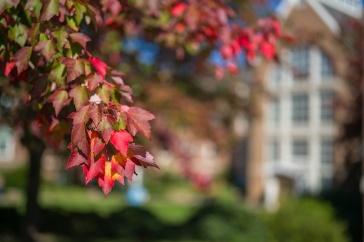
Henry Herndon speaks at the 2017 Portsmouth Climate Rally.
When Henry Herndon '15, '17G arrived at UNH in September 2011, he didn’t have a career in mind; he was just eager to learn “how the world works.”
The political science major soon discovered an ardent interest in the politics and economics of climate change and sustainability — the result in part from a study-abroad program in Costa Rica and a semester in Washington, D.C. He found a meaningful way to synthesize these issues in a class taught by Clay Mitchell, a lecturer in the department of natural resources and the environment, called Introduction to Sustainable Energy and Our Energy System.
“The class was hyper-focused on New Hampshire’s evolving energy system, recent policy developments, early markets for solar and other emerging energy technologies,” Herndon says. “It’s where I realized that I want a career in energy, and I want to do it here in New Hampshire.”
Since earning his bachelor’s degree, Herndon has been steadily working toward his goal: He has interned at the UNH Sustainability Institute and, in 2017, earned a Master of Science in natural resources from UNH, during which he was awarded a prestigious Switzer Environmental Fellowship.
“There’s this exciting future where communities are prosperous and healthy because they’re generating their own energy, and they’re also reducing the global supply chain consequences of energy production that are the source of violence and conflict around the world.”
While in the natural resources master’s program, Herndon worked closely with Catherine Ashcraft, assistant professor of natural resources and the environment, and conducted research in her Environmental Policy, Planning and Sustainability Lab. He credits Ashcraft with giving him the opportunity to “dig deep into real-world issues.”
“Henry has an infectious passion for contributing to energy solutions through community engagement and building new partnerships between regulators, industry and consumers,” says Ashcraft. “His work is a great example of how UNH’s research provides timely and valuable policy recommendations and opportunities for engaging with partners to apply research to practice for the benefit of our state and communities.”
With Ashcraft’s support, Herndon helped launch an outreach initiative called Energize 360 in the Seacoast area. Based on Vital Communities’ Solarize program, Energize 360 aims to connect residents and small businesses with solar installers and energy efficiency companies, promote awareness of renewable energy options and benefits and provide information about programs that can help pay for improvements like solar panels, LED lighting and insulation.
Initially, the communities of Durham, Dover, Lee, Northwood and Portsmouth signed on to host educational events, and the program eventually spread to seven more towns on the Seacoast.
“The idea was to create a space for people to ask questions like ‘What is net metering?’ and ‘How do I generate a return on investment for my solar?’” says Herndon. “A lot of people don’t know that there are state programs that help finance improvements that will increase home energy efficiency.”
Now, Herndon is working for the NH Sustainable Energy Association and recently received another accolade from the Robert & Patricia Switzer Foundation: a Switzer Leadership Grant, which recognizes the high impact nature of his work.
“As a part of my fellowship now, I work with local energy committees and municipal staff,” he says. “I could be helping with public outreach for a solar or weatherization campaign or providing information to the municipal staff about energy projects they could implement or connecting them with other energy committees and energy professionals from neighboring communities to share information and best practices.”
He is charged with no small task: New Hampshire has 234 cities and towns, and about half have energy committees.
“An important part of my job is finding the towns that need more guidance and seeking out the opportunities to connect them with the right resources,” explains Herndon. “I’m not going into these communities and saying ‘This is what you need to do.’ I’m asking, ‘What do you need, and how can I help you get what you need?’”
While Herndon is excited about effecting change at the grassroots level, he acknowledges that when it comes to a long-term restructuring of the energy system, the obstacles are numerous and complex.
“The single biggest challenge is a utility company and regulatory world view that still has no incentive to change,” says Herndon. “They don’t share the vision of a localized, competitive and efficient sustainable energy system. It’s really a significant change from the old model where it’s one company, they set a price, you pay the price and that’s it.”
Which brings Herndon to where he sees himself in five years — leveraging his relationships with municipalities and his understanding of the regulatory commissions and the renewable energy industry to help implement smart grid, time-based energy management systems at the local level in New Hampshire.
And despite the challenges, he is optimistic that innovators and leaders in government and the emerging energy industries will generate solutions that work for everyone.
“There’s this exciting future where communities are prosperous and healthy because they’re generating their own energy, they’re sustainable and reducing their environmental impacts, and they’re also reducing the global supply chain consequences of energy production that are the source of violence and conflict around the world,” he says.
But for now, Herndon remains laser-focused on the state he now considers his home.
“Ten years ago there were three solar companies in New Hampshire; today there are 90, and the next decade will be even more dramatic,” he says, casting his eyes in the direction of a new solar array on a local church in Durham. “I feel like I can have an impact in New Hampshire — and I already have had an impact in New Hampshire.”
-
Written By:
Sarah Schaier | College of Life Sciences and Agriculture



















































